Spain on Monday reported no official deaths from the new coronavirus in a 24-hour period for the first time since March.
The development is “very, very encouraging,” emergency health response chief Fernando Simón said.
Also, Spain recorded only 71 new COVID-19 infections over the past 24 hours, he told a news conference.
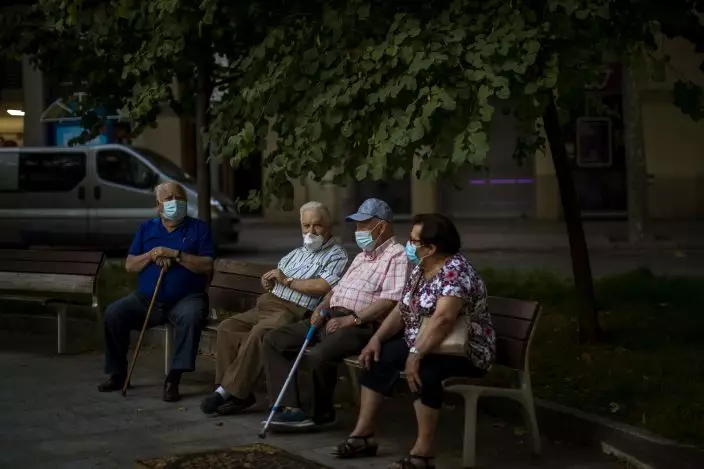
Elder people wearing face masks sit on a bench in a square in Barcelona, Spain, Sunday, May 31, 2020. Spanish Prime Minister Pedro Sánchez says he will ask Spain's Parliament for a final two-week extension of the nation's state of emergency that has allowed the government to take lockdown measures to control its coronavirus outbreak. (AP PhotoEmilio Morenatti)
“We are in a very good place in the evolution of the pandemic,” Simón said. “The statistics are following a trend. They are going in the right direction.”
Spain reported its first two deaths on March 3. Another was reported two days later. Spain’s number of infections and death jumped exponentially. On April 2, it recorded 950 deaths in 24 hours — the peak death toll.
The official death toll now stands at 27,127, with 240,000 confirmed cases.
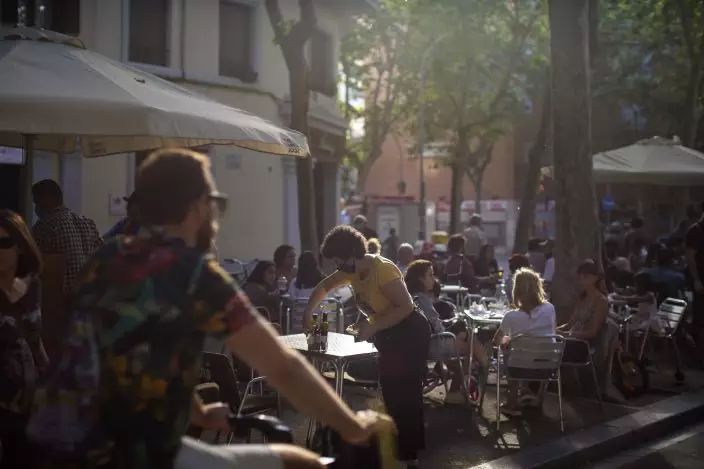
Customers sit at a terrace bar in Barcelona, Spain, Sunday, May 31, 2020. Spanish Prime Minister Pedro Sánchez says he will ask Spain's Parliament for a final two-week extension of the nation's state of emergency that has allowed the government to take lockdown measures to control its coronavirus outbreak. (AP PhotoEmilio Morenatti)
Spain was the second European country after Italy to be forcefully hit by the pandemic before it also spread death in France and Britain. One of the world’s strictest lockdowns was put into place in mid-March and managed to eventually reduce the pressure on hospitals after some were overwhelmed with patients suffering from the virus.
The lockdown is gradually being relaxed as the medical situation improves.
The Spanish government has warned, however, that the threat is not over and that the loosening of restrictions could be reversed.
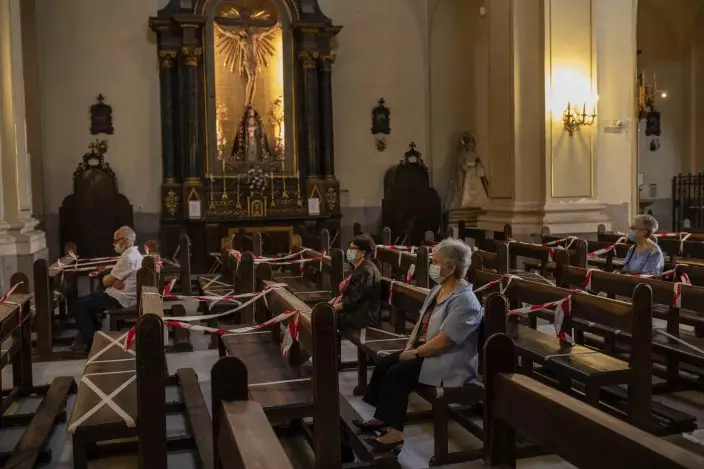
Catholic worshippers, wearing face masks protection to prevent the spread of the coronavirus, attend a mass at the San Ildefonso church in Madrid, Spain, Sunday, May 31, 2020. (AP PhotoBernat Armangue)
Spanish Prime Minister Pedro Sanchez said last weekend he will be asking parliament for an extension of the government’s special emergency powers for another two weeks. That enables authorities to order people to stay home.
Simon said recent hot spots caused by people holding unauthorized “fiestas” can potentially bring a major new resurgence.
“We are still at risk. Any of these outbreaks can mean a new wave of infections,” he said. “We must remain cautious.”
Follow AP pandemic coverage at http://apnews.com/VirusOutbreak and https://apnews.com/UnderstandingtheOutbreak
Spain took another step Wednesday toward a sense of normality amid the pandemic by partially ending the near two-year-long obligatory use of masks indoors.
The government decree, passed Tuesday, keeps masks mandatory for visitors and staff in medical centers and nursing homes, although patients won't always be obliged to wear them.
Masks will also be mandatory on all forms of public transportation, but not in stations or airports.
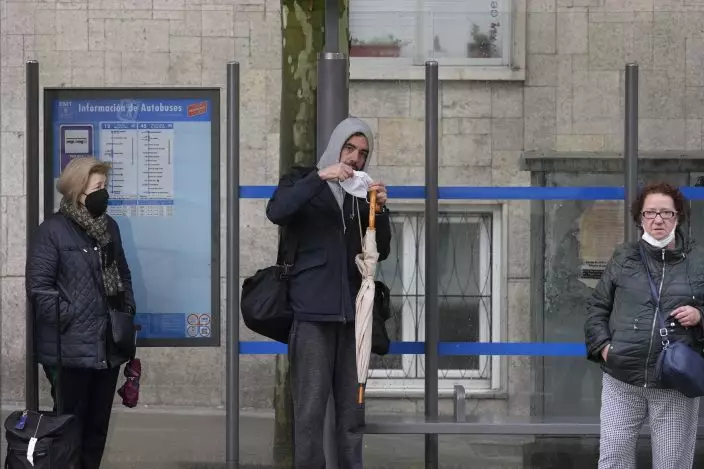
A man puts on his mask to protect against the spread of COVID-19 before boarding a bus in Madrid, Spain, Wednesday, April 20, 2022. Spain is taking another step toward post-pandemic normality by partially ending the obligatory use of masks indoors. A government decree taking effect Wednesday keeps masks still mandatory in medical centers and in all forms of public transport. (AP PhotoPaul White)
It remains unclear what impact the decree will have on workplaces such as public and private company offices, banks, factories and stores as the government is letting employers decide to keep them in use if they deem there is a health risk.
In turn, they are recommended, but not obligatory, in multitudinous gatherings, in packed areas or in the presence of vulnerable people. Schools are also exempted from having to use them.
Masks became obligatory indoors and outdoors shortly after the beginning of the COVID-19 pandemic in Spain early 2020. The restriction for outdoor use was lifted in mid-2021, but reimposed between December and February amid a major surge of infections of the highly contagious omicron variant.
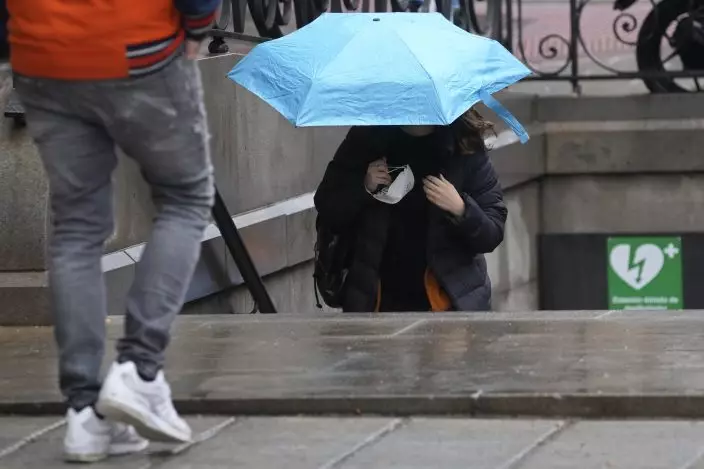
A woman carries her mask to protect against the spread of COVID-19 as she comes out of a subway station in Madrid, Spain, Wednesday, April 20, 2022. Spain is taking another step toward post-pandemic normality by partially ending the obligatory use of masks indoors. A government decree taking effect Wednesday keeps masks still mandatory in medical centers and in all forms of public transport. (AP PhotoPaul White)
“The mask without doubt has been one of the most identifiable measures over the past two years and it will no longer be obligatory,” Health Minister Carolina Darias said Tuesday. “They will continue to be with us as an element of protection, particularly for the most vulnerable."
With more than 92% of Spaniards over 12 years old having received at least two vaccine doses and the number of coronavirus infections and deaths dropping sharply in recent months, Spain has also eliminated mandatory home isolation for people infected with the virus who experience no symptoms or mild ones.
The ebbing of the pandemic comes as Spanish prosecutors turn their attention to possible illegalities in the purchasing of masks and other medical products by authorities in the critical first few months of the outbreak.
Two of the most prominent cases involve the Madrid region and the capital city's town hall.
State prosecutors are investigating two men who they say pocketed more than 6 million euros ($6.5 million) in commission by selling masks and other products to Madrid city hall at exorbitantly inflated prices. Prosecutors say the two bought luxury cars, watches and even a yacht with the money.
Meanwhile, Spanish and European prosecutors have also been looking into the purchase of masks by the the Madrid regional government in a deal brokered by the brother of regional president Isabel Díaz Ayuso for a substantial commission.
In both cases, authorities say they acted in good faith during a national emergency and that it was extremely difficult to obtain these products at the beginning of the pandemic.
Meanwhile, analyzing the books of Spain's major cities and some major institutions during the first three months of the pandemic, Spain's Court of Auditors has found that there were often major exorbitant differences in the prices paid for masks and other products.







